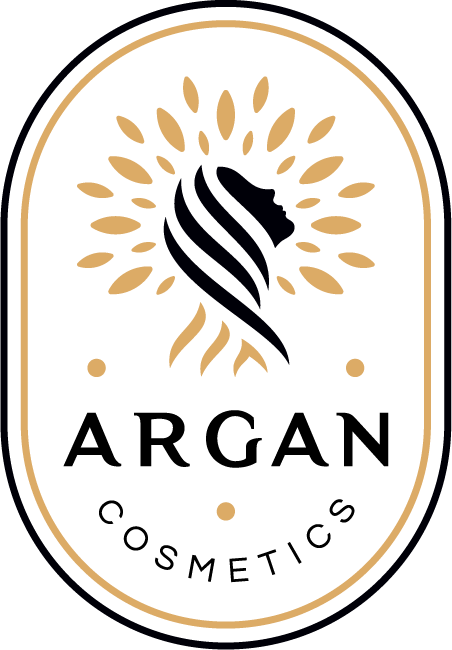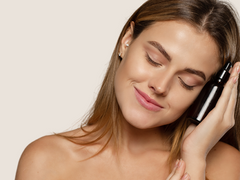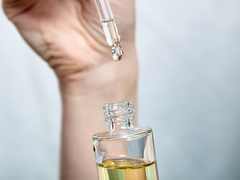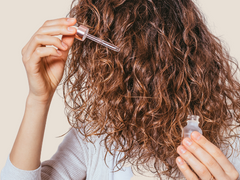
4 Alternatives to Traditional Hair Conditioner
There is no shortage of conditioners on the market that claim to give you hydrated, soft, silky smooth hair. However, most of the traditional conditioners are packed with silicones and parabens, which can do more harm than good.
What makes it even worse is that many of these conventional hair care products have not been tested for safety. Chemicals applied to the skin basically have no barrier from entering the bloodstream, making them potentially very dangerous.
Many of us want beautiful, shiny, healthy locks, but have been hesitant to ditch the hair conditioner we got at the drugstore.
Well, it’s time to say goodbye to traditional hair conditioners and say hello to some alternative options that are natural, safe, and can even save you money!
Why You Need to Condition Your Hair
Conditioning your hair after you shampoo is essential if you want to have healthy, hydrated, silky smooth hair.
If you skip out on conditioning, your hair is more prone to breakage, which can make your hair appear thinner. Additionally, if you skip conditioner and continue to use hot tools, your hair will likely become even more prone to damage.
When you condition your hair, you’re ensuring your hair is hydrated, protected, and shiny. Conditioning even helps revive damaged, dry, chemically-treated hair. As a bonus, conditioning helps decrease tangles. No more tearful brushing!

4 Alternatives to Traditional Hair Conditioner
No need to buy those questionable commercial hair care products anymore. There are plenty of natural, safe ways to condition your hair. Some of these are probably in your kitchen cabinet and, spoiler alert, one of these alternatives is our very own Argan Oil.
Here are 4 alternatives to traditional hair conditioner for you to try out:
Apple Cider Vinegar
Apple cider vinegar has been around for thousands of years and there are endless uses for it, including hair care. And since it is such a versatile product, odds are you probably already have this in your home.
This is a very popular alternative to hair conditioner, and it’s easy to see why. Apple cider vinegar is praised for being rich in vitamins and minerals good for hair, like vitamin C and B. Apple cider vinegar is also acidic and, when used on hair, it softens the cuticle leaving your hair softer and easier to detangle.
Apple cider vinegar is also antibacterial and anti-fungal, meaning it promotes hair growth and healthy, functional hair follicles. It also easily removes soap and oil build-up without damaging your hair and fights dry skin and dandruff.
Results: Shiny, silky hair, and as a bonus, you can go longer between washes.
How To Use Apple Cider Vinegar as a Conditioner
- Combine 1 part apple cider vinegar with 1 part water in a bottle or spray bottle.
- After shampooing, either pour or spray the mixture onto your hair.
- Gently massage into the hair and scalp.
- Let sit for a couple of minutes.
- Rinse with water.
Coconut Oil
Coconut oil is another alternative that you may already have in your home. However, if you plan to use it on your hair, be sure to use organic, unrefined coconut oil.
Since coconut oil can easily penetrate into the hair shaft, it provides deep conditioning and tons of benefits. Thanks to its fatty acids and antioxidants, coconut oil brings softness back into your hair and prevents damage to the body of your hair, including heat and environmental damage. This keeps your hair looking full.
However, if you do have damaged hair, coconut oil provides relief to your damaged locks and helps in regrowth. Got dandruff? Coconut oil provides relief from that, too.
How To Use Coconut Oil as a Deep Conditioner
- Part your hair in manageable sections (ensures you coat every strand).
- Liquefy 1 to 2 teaspoons of coconut oil.
- Lather on the ends of your hair.
- Massage into scalp (optional).
- Put your saturated hair in a shower cap or wrap it in a towel.
- Let sit for 20 to 30 minutes, or overnight.
- Fully rinse your hair and wash with shampoo (you may need to wash your hair more than once to fully remove all the oil).
Note: Coconut oil can sometimes stain fabric, so be sure to protect your bedding and wear clothes you’re fine with messing up a bit.
Aloe Vera
It’s safe to say that the healing and soothing powers of aloe vera are legendary. It’s not only great to use on skin, but also makes for a great hair conditioner alternative.
Aloe vera is a powerhouse. It contains 7 out of the 8 primary amino acids, Vitamins A, C, and E, as well as Vitamins B12 and B9. The amino acids help repair hair damaged by over drying or chemically treating, while the vitamins are essential for hair growth.
Additional benefits of using aloe vera in your hair include hydration, fewer flakes, and a decrease in scalp inflammation and irritation.
To get the best results, we recommend starting with an aloe plant to ensure you’re getting the purest form of aloe vera. This route may take some planning, but is easy to do.
To begin, snip off a leaf from the plant. Let the cut edge sit for 8 to 24 hours. This allows the sap to drain. Then, remove the outer skin of the leaf and, with a spoon, remove the inner gel. That inner gel is the magic ingredient that will be used for your hair.
How to Use Aloe Vera as a Conditioner
- Apply aloe vera gel to wet hair, beginning at the scalp and working towards the ends.
- Let sit in your hair for 3 to 5 minutes.
- Rinse hair thoroughly.
Argan Oil
Our Argan Oil is one of the easiest conditioners you could use, and it can be used in a variety of ways to maintain your hair.
Argan oil, affectionately dubbed “liquid gold,” is produced in the stunning country of Morocco. Since 600 BCE the women of Morocco have been producing and utilizing this oil, and it is easy to see why.
The oil is mainly composed of fatty acids — oleic acid and linoleic acid. Linoleic acid, also known as omega-6, and oleic acid have been shown to help lubricate the hair shaft. This helps your hair retain moisture and keep it hydrated.
Argan oil is also rich in vitamin E, the vitamin responsible for healthy hair, among many other things. Vitamin E forms a fatty layer to the scalp and hair, which prevents dryness.
Obviously, argan oil is extremely hydrating, but also has a ton of other benefits. You can think of argan oil as the jack-of-all-trades when it comes to hair care. In addition to hydration, argan has been proven to reduce split ends, encourage hair growth, extend the life of hair color, tame frizz, and promote shine. If that doesn’t convince you to incorporate argan oil into your hair care routine, what will?
How to Use Argan Oil as a Conditioner Treatment
- Apply a small amount of argan oil to wet hair, roots to ends.
- Comb oil through hair.
- Ring out excess water and let sit for 10 minutes, or overnight.
- Shampoo and style as usual.
How to Use Argan Oil as a Leave-in Conditioner
- Wash hair thoroughly with shampoo of choice.
- Towel dry hair.
- Rub 2 to 3 drops of argan oil in hands and apply to hair with fingertips.
- Dry and style hair as usual.
- Do this twice a week.

Where To Buy Argan Oil for Hair?
Just because there’s “argan oil” on the label, doesn’t mean that it’s good quality or high potency. In fact, many hair care companies lead you to believe that you’re buying pure argan oil, when really their product is filled with silicones, water, and preservatives, then they add a dash of argan oil for marketing. That’s why we sell 100% pure Moroccan Argan Oil, sourced ethically and responsibly from Morocco.
Our argan oil is an incredible tool for maintaining strong, soft, frizz-free hair. If you’re looking to pick up your own bottle, you can check out our argan oil here!



